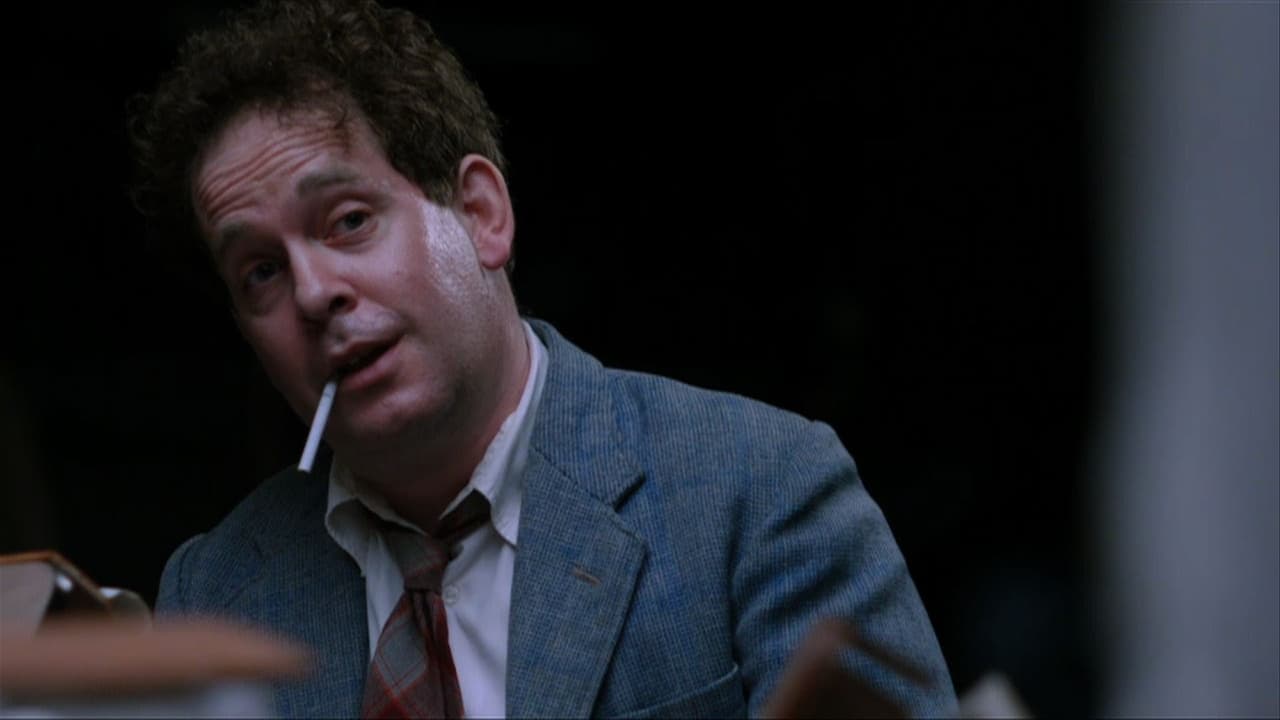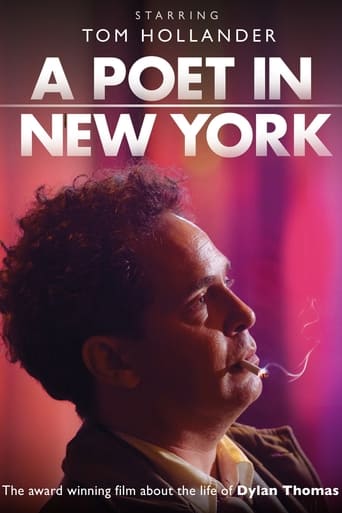




Terrible acting, screenplay and direction.
Some things I liked some I did not.
Brilliant and touching
A terrific literary drama and character piece that shows how the process of creating art can be seen differently by those doing it and those looking at it from the outside.
View MoreThis film tells the story of a talented British poet, whose life is ridden with alcoholism and poor health. His womanising ways does not help with guys marriage either, causing every bit of his life to fall apart."A Poet in New York" may look good on paper, but the end result is quite ridiculous. I can't imagine a man bursting into poems every time he speaks. The poems are not even relevant to the questions or contexts at times, hence the social exchanges are very weird. The film does not capture me in any way, unfortunately. I found it very boring and unconvincing.
View MoreIt is surely difficult to encompass the life of anyone in little more than an hour. This bio-drama concentrates on the last days of Dylan Thomas, with flashbacks to his youth and happier days. The result is a successful arc of the man's life, ultimately disappointing as it was.Thomas was an intemperate boor haunted by past failures and as unhealthy fear of an unpromising future as this dramatization tells it. Certainly most of it is true.So many literary luminaries are self-destructive and personally disappointing. That one more does not stand as an icon to strength of character is no revelation, but it does give an alternate view of Thomas' works. Long after "Fern Hill", he goes to America not to anoint the masses, but to escape the prison of his marriage. And "Do Not Go Gently into that Good Night" becomes less a passionately strong urging to remain steadfast and more a pitiful pleading to not be abandoned. But meaning, like beauty, is in the eye or ear of the beholder.Tom Hollander gives a strong performance as the poet and he is surrounded by a corps of captivating actors. New York City in 1953 comes alive and provides an appropriate backdrop for the poets downfall. What started as a green and golden existence dies among the figurative gray ash heaps of Eliot's 20th century, perhaps too innocent and too frail to survive in a world of ragged claws.
View MoreThe factual errors stood out like New York skyscrapers. And worse, far worse, was the continuation of this sentimental, ultimately soggy romantic vision of the tortured poet whose grip on existence solely revolves around his ability to pluck poems from the life-defying chaos. Dylan himself didn't even know when he was lying so it's up to those writing about him now to sort the truth from his fiction. He said he couldn't eat, sleep, f*** or drink but in this managed to do at least two of them rather well considering and if you substitute unconsciousness for sleep then three (breathe would have been a better addition). He still managed to complete Under Milk Wood, had Stravinsky waiting for a libretto, was roasting hostesses among others (I'm unfamiliar with the sources for the nameless blow-job girl), and was necking booze like it was coming into fashion. Eighteen straight(double)whiskies was merely his proved last lie and it's sad enough to perpetuate that. But all this was nothing to compare to the sight of his spirit lifting from his corporeal self on his hospital bed on his death (not while unromantically being given a bed bath which would have been the truth) and then this phantom phantom rising to smile as it watched its younger self gambolling through the child high hay around pretend Fern Hill. It was a scene that would have been perfect in a Powell and Pressburger film of the 1940's but is laughable now. Even the 'wild' Dr Feltenstein was more Dr Finlay - perhaps because the haze of litigation is the primary pollutant of the New York City air these days. Brinnin was portrayed as a devoted friend with a crush on the poet rather than a purveyor of the very myth this film perpetuates. There was no need for Dylan to die in New York and with better medical treatment and guardianship he wouldn't have done. It raises the question of why make a film in the centenary year of the poet's birth that concentrates so much on the poet's death. The answer must be because it is more dramatic and commercial. This was the same motivation for Brinnin's 'Dylan Thomas in America', which was full of inaccuracies, the reasons for many of those being rather dubious. It is this account on which the film seems largely based when something closer to the truth is far easier to come by these days. Beautifully acted and filmed but...
View MoreAn absolutely superb film dealing with a subject which reeks with creative pitfalls. Tom Hollander's bravura uncompromising performance was matched by a supporting cast - Phoebe Fox and Ewen Bremner were fabulous in particular - that allowed the director (Aisling Walsh) to paint a picture of this great poet's desperately sad life without whimsy, and without clichés. Beautifully photographed and realised, this was the best biopic I have seen for a long time.The script written by Andrew Davies used the poetry to great effect and balanced Thomas's brilliant language with some effective and poignant dialogue - no mean feat. The integration of period footage of New York in 1952 was seamless - presumably colorised Black and White, but the cinematography, costume design and art direction added a modern atmosphere to the film instead of the often used lazy cod stylised attempts at period visual approximation which make the imagery seem so unrealistic and unbelievable. For reasons that seem baffling, it wasn't given much promotion by the BBC. No doubt the schedulers were too busy pushing the other ridiculous rubbish TV executives pepper their schedules with these days. This was great television drama. On a philosophical note: I know about that desperation and pressures Walsh/Davies so cleverly delineated, and I know how seductive New York can be from its seedy dives, its cocktails, its somewhat superficial parties, and its artistic magnetism. Tragic that all these attractions have the power to destroy so much talent, and in Dylan Thomas's case, at such a tragically young age.
View More